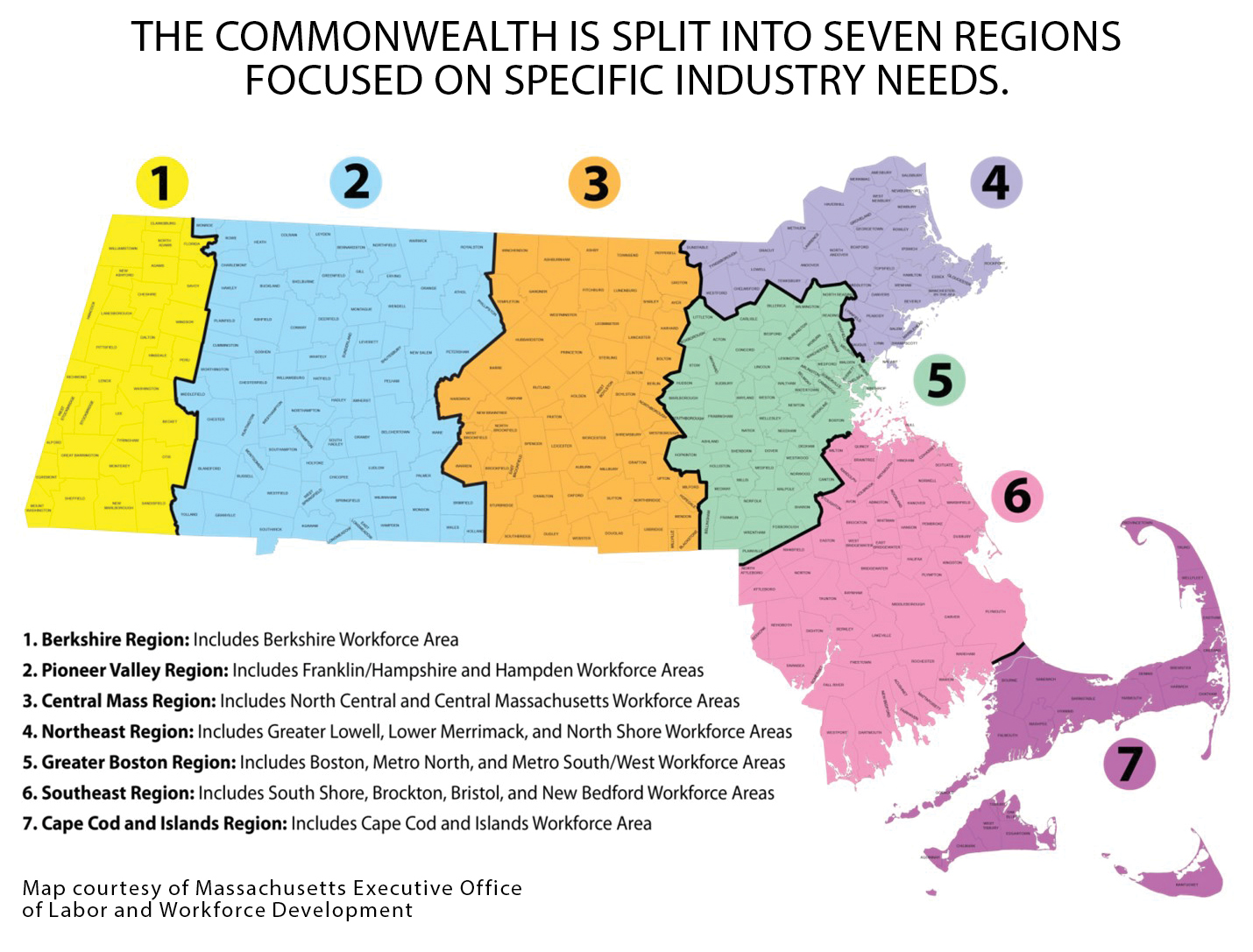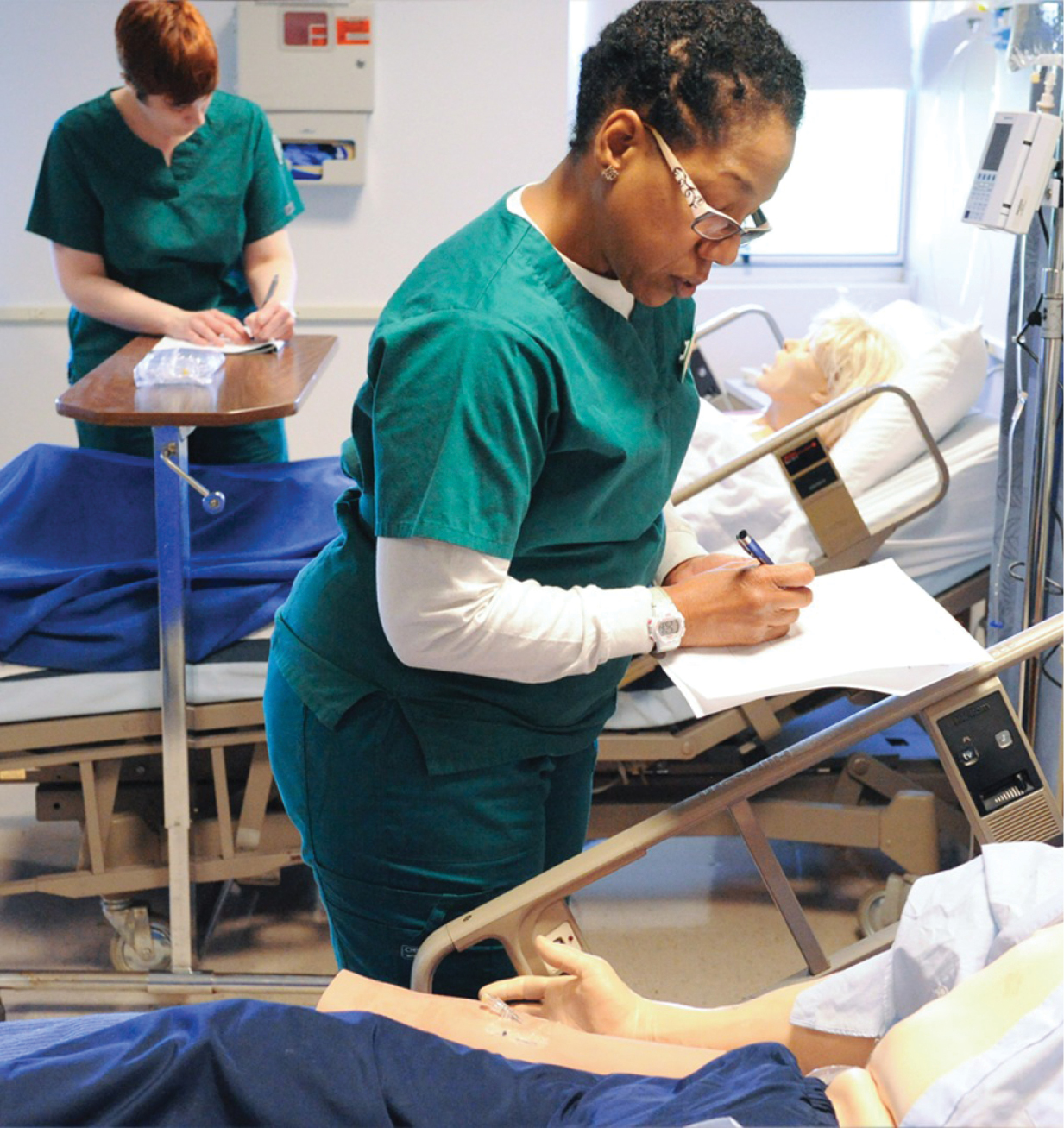When assessing skills harbored by the Massachusetts labor market, one might first consider the state’s impressive tech sector, though the Commonwealth’s industries go deeper and its skills stretch farther.
This is due in part to the resources available to employers to not only land top talent, but refresh skills that retain workers in the state.
“Regardless of industry, employers are looking for all types of employees, but, in particular, employees with technical skills and knowledge in growing sectors like healthcare, IT, manufacturing, biotechnology, skilled trades and business services,” says Michele Campbell, director of communications at the Massachusetts Executive Office of Labor and Workforce Development.
Massachusetts’ growing industries are prone to innovation.
In recent years state leadership has invested in a variety of workforce development initiatives which have yielded promising results. As of December 2022, the unemployment rate sits at 3.3% and the workforce participation rate is 65%.
As the nation continues to recover from job loss associated with the global pandemic, Massachusetts has seen steady recovery due in part to collaboration throughout the Commonwealth helping both employers and employees fill open roles.
Regional Guidance
The previous Baker-Polito Administration took a new route in addressing workforce needs and bridging the skills gap throughout the Commonwealth in 2017. The Governor’s Workforce Skills Cabinet (WSC) connected with economic development leaders, educators, businesses and community stakeholders to gain an understanding of priorities throughout the state.
This move marked the first time education, workforce and economic development sectors in Massachusetts teamed up to make development decisions. While developing its strategy, the initiative veered toward a regional planning approach.

The Massachusetts Offices of Labor and Workforce Development, Education, Housing and Economic Development as well as the WSC identified seven regions throughout the Commonwealth: Berkshire, Pioneer Valley, Central, Southeast, Cape, Greater Boston and Northeast.
Each region has crafted its own “blueprint,” which focused on the strengths and workforce skills relevant to each region’s industries. These blueprints then serve as the basis to inform policy, practice and funding decisions related to workforce development. The most recent update for each region’s blueprint took place in 2020, assessing challenges as a result of COVID-19 and ways in which to move forward.
In the Pioneer Valley region, healthcare, education services and advanced manufacturing industries lead the 73-county area, representing the largest of the seven regions. In its updated 2020 focus, the region put institutional partnerships at the forefront of its approach to workforce development.
“The community college system in Massachusetts is a critical partner in workforce programming. They often serve as the lead for a grant with company partners to build out new education and training for adult workers,” says Campbell.
The Educator Work Group was created by the Pioneer Valley Regional Planning Team to identify technical programs currently offered throughout local institutions and address their relevance to the region’s leading industries. The group consists of Springfield Technical Community College, Holyoke Community College, Greenfield Community College, eight vocational technical high schools and Westfield State University.
Together the institutions will work to design educational and career pathway programs with priority on healthcare, education services and advanced manufacturing. Data collected from post-graduation job placements will be critical to the evolution of the curriculum, keeping these programs relevant to employer needs.
Efforts such as this can be seen throughout the Commonwealth as the initiative enters its fifth year of development.
“To scale up education and training programs in Massachusetts to meet current and future hiring needs across the state, we need everyone at the table, training partners, community colleges and educational organizations, workforce intermediaries (MassHire), employers and jobseekers,” says Campbell.
A Bright Future
In January 2023, The Executive Office of Labor and Workforce Development (EOLWD), WSC and Commonwealth Corporation (CommCorp) announced $3.6 million in workforce grants had been distributed to employers through the Career Technical Initiative, Scaling Capacity and Leveraging Employers (SCALE) and Replenishing Employer iNvestment in Education &Workforce (RENEW) training grants.
The SCALE and RENEW grants are funded by the American Rescue Plan Act (ARPA), the $1.9 trillion economic stimulus bill passed in 2021. Grants awarded this round cater to industries such as automotive manufacturing, healthcare, plumbing and cybersecurity, providing training to over 400 residents.
The RENEW grant is encompassed in WSC’s FutureSkills strategy. Funding provides training and upskilling resources for unemployed workers who are then hired, encouraging employers to replenish the fund for future use. This year, in collaboration with MassHire, EOLWD is focused on advancing its FutureSkills initiative.
“Primarily funded by the American Rescue Plan Act, we are driving greater workforce equity through our FutureSkills initiative,” Campbell says. “It’s a $200 million investment in job training and upskilling for careers in high-demand industries like healthcare, technology, life sciences, finance, the trades and more.”
The grant program aims to connect workers with open roles or access training to develop skills within Massachusetts’ leading industries, while working with employers to find immediate talent for hire, training partners or funding for workforce development.
Aside from funding opportunities, departments like MassHire play a key role in helping jobseekers and employers across the whole state find the right fit, fast.
“The MassHire Department of Career Services oversees Massachusetts’ network of 24 Career Centers that assist businesses in finding qualified workers, and provide jobseekers with career guidance, job referrals and training,” says Campbell.
The MassHire system works with over 14,000 companies a year to assist with recruitment or connect them with education and training programs catered to both youth and adults, creating a pipeline of skilled talent. These centers are a pillar throughout each of the regional blueprints.
Regardless of location through the Commonwealth, grant funding and workforce training opportunities can be accessed and tailored to specific industry needs.

